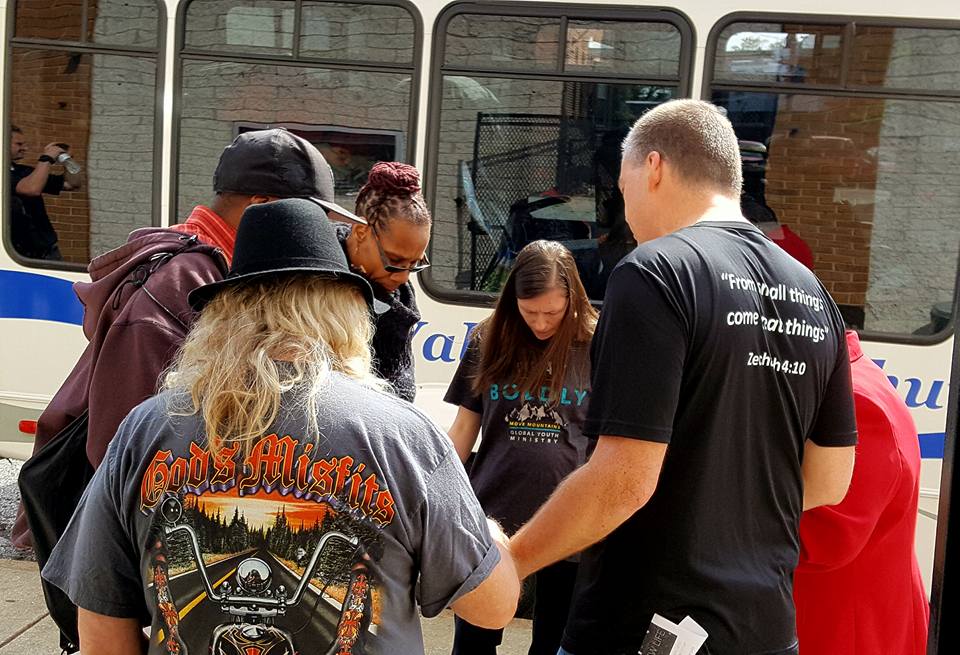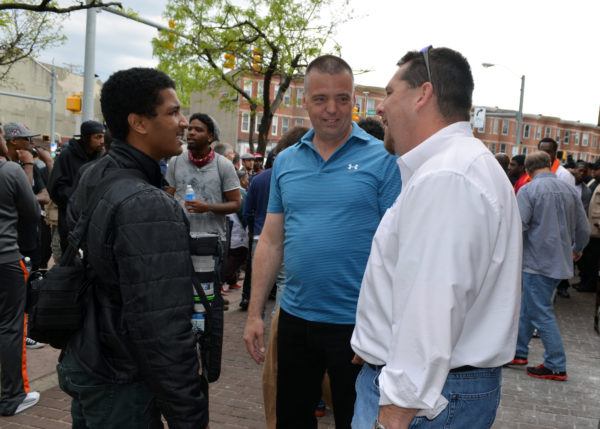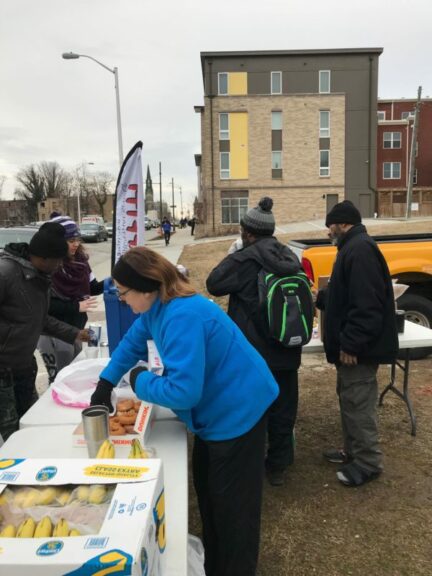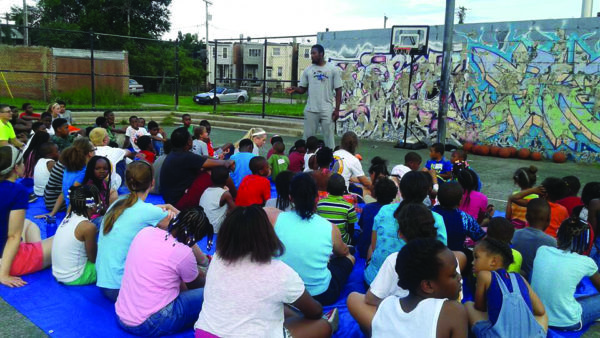Called to the City

By Sharon Mager
Diane Brown grabs her coat and heads out the door on a brisk Sunday morning to walk to East Baltimore Graffiti Church (EBGC), which she and her husband, Charlie Brown, started in 2015. She loves being able to walk to church. As she passes by a group of young men huddled on a corner, one approaches her and offers her drugs. “No, I’m on my way to church,” she smiles kindly at him. He apologizes, shuffles back, and tells her he won’t let anyone else bother her. Another of the men looks up and calls to her, asking Diane to pray for him, and she assures him she will. “I mean it, really, pray for me,” he shouts again. So, after church, she and Charlie meet with the men, and they pray.
Charlie and Diane love their ministry, their neighbors, and the opportunity to live in the city a short distance from the church. Some may be intimidated by sharing the Gospel with local dealers, and more would be shocked to learn that the Browns do it in spite of the fact that in the fall of 2020, their beloved 34-year-old son, Anthony — a father, a former student at Washington Bible College, and believer in Jesus, who struggled with addiction but had been long-term clean — bought drugs on a corner near the Browns’ home. Perhaps on the same corner Diane passed, from the men Diane spoke with. Anthony, who used those drugs on the Browns’ back porch, overdosed and died.
But God called Charlie and Diane to the city. And God has given them a peace that surpasses all understanding, and joy, even in the midst of their pain, heartbreak, and tears.
Before Graffiti, Charlie and Diane lived in a cozy waterside condo in Chesapeake Beach and Charlie ministered as an associate pastor at Dunkirk Baptist Church alongside former Dunkirk Pastor Rick Hancock. Meanwhile, Diane taught in a Calvert County public school. They were settled. Comfortable.
Still, the couple, nearing their 50s, felt a certain discomfort — a prompting in the back of their minds and hearts, and began to consider it a message from God — signaling, perhaps, they were not where they were supposed to be. Charlie and Diane prayerfully agreed that God was leading them to do ministry elsewhere. But where?
They considered the possibilities. International ministries? They had friends who had invited them to join them to live and minister in Guatemala full-time. Or perhaps nationally? Locally?

Charlie Brown (c), Joel Rainey (r), the pastor of Covenant Church in Shepherdstown, West Virginia, and Carde Cornish (l) a member of The Garden Church in Baltmore, serve in the aftermath of Freddie Gray’s death (photo by Shannon Baker).
Called to urban ministry
“Charlie felt called to urban ministry,” says Diane. Having overcome a drug addiction thirty years ago, Charlie always had a sympathetic heart for people in the city. So, he jumped when he had an opportunity to visit Graffiti Church in the Lower East Side of New York and met Graffiti’s founder, Taylor Field, who asked Charlie to plant a church in Coney Island. Charlie was ecstatic at the possibilities and excitedly shared the news with Diane. He wanted to accept, but God wouldn’t give him the green light. Charlie and Diane visited Coney Island several times, meeting people, and observing the ministry and were awed at what God was doing. They felt it just wasn’t where God wanted them.
Diane says, “When Charlie was a warehouseman at Giant and God called him to ministry, we knew it would be a huge financial cut in pay. It would be a risk with uncertainty, but we knew that’s what God was calling us to do.” It was the same when they left Bayside Baptist Church in Chesapeake Beach where Charlie served as a youth minister, and Dunkirk Baptist Church. “We weren’t sure where, but we knew God was calling us to leave. It didn’t make sense, but God does things in incredible ways,” Diane explained. This time, though, Diane said they just didn’t have the peace to move to New York.
After reaching out to their ministry contacts and visiting several cities, the Browns realized that God was moving them towards Baltimore.
They began spending their weekends downtown. Sometimes Charlie would jog through the streets to get exercise and seek God’s direction. As a couple they prayer-walked, changing their routes, sometimes east, sometimes west. “God kept bringing us back to Greenmount Avenue,” shares Charlie.
The couple spent time connecting with people in the Greenmount area, and then driving home in tears, broken for the families dealing with so much pain who needed to experience the abundant life Jesus had to offer. They finally knew exactly where God wanted them.
Charlie interned for six months with Joel Kurz, the pastor of The Garden Church. Working alongside Kurz, Charlie was immersed in theological studies, and poverty, and addiction ministries. As part of the immersion process, Charlie lived with Garden Church members Matt and Rochelle Mattheson. “I loved them,” Charlie says.
Graffiti Church leaders in New York also helped with the training. Diane shares, “Charlie was intrigued with Graffiti’s way of doing ministry, going into the toughest neighborhoods and serving the most under-served people. We both really connected with that and they are so excellent in the way they do everything.” The couple traveled to New York to study urban ministry in more depth and to see how Graffiti ran their sports camps. New York Graffiti members also came to Baltimore to help with the training. “They were great, and we appreciated it so much,” says Diane.

Diane Brown sets up a donut and coffee station early in the morning at a busy bus stop.
Donuts, coffee, and hot dogs
When Charlie and Diane officially launched EBGC, they jumped in with both feet, even though Diane was still teaching in Calvert County and has commuted there for work ever since.
Early on weekday mornings, Charlie, Diane, and other volunteers handed out hot coffee and donuts to commuters on the corner of Greenmount and North Avenues, one of the busiest bus routes in Baltimore city. In the evenings, they gave away hot dogs. They’ve had their share of commuters, sharing their stories and their tears, asking for prayers, needing hugs.
Charlie intentionally reached out to local city leaders, and to potential partners locally and nationally. Working with Baltimore City, East Baltimore Graffiti Church began a successful tutoring ministry on the second floor of a recreation center.
Another initiative that brought much fruit was connecting with Collegiate Minister Mike McQuitty, who was working with students at Towson University and Johns Hopkins campuses.
“That was really interesting and mutually beneficial,” shares Charlie. “I started going up to the campus supporting Mike’s ministry. Then college students came down and volunteered in our neighborhood and some loved it. We began to develop servant leadership with college students. Now, five years later, we have young adults who graduated from Towson University, some are getting ready to marry each other, and they’re still serving with us at Graffiti. They’ve taken urban business and teaching jobs so they can stay in the city and serve God. We would not have survived the last six years here without our strategic collegiate church planting relationship,” Charlie comments.
The collegiate ministry is how Charlie connected with Carolos Melendez, a student who started ministering alongside Charlie and began serving as the church worship leader. “Carlos also became our first missionary,” Charlie explains. He went to Cambodia, served two years, and is now teaching. He is due to return in late summer. “We’re very excited about the next steps God is leading him to take,” Charlie says excitedly.
“College students helped us minister to a lot of the children in the area. A large part of EBGC’s outreach is to children and youth. We worked with mission teams and knocked on 1,000 doors that first spring. We asked, ‘What do we need most in our neighborhood,’ and almost every one said more stuff for kids to do,” Charlie shares.
The church listened to this feedback and started sports camps for kids in kindergarten through eighth grade, copying the model of Graffiti 2 in the Bronx. They threw block parties full of music, food, and fun. That gave them opportunities to meet parents and kids and register students for the camps. Several BCM/D churches arrived to lend a hand.
Hundreds of kids showed up in Baltimore’s Mundt park for six weeks of football, soccer, basketball, and cheerleading camps. Church volunteers served breakfast and lunch, taught the kids sports skills, and about the love of Jesus.
Partnerships
In addition to the college students, volunteers from around the country have helped EBGC. Charlie says, “I could tell you 1,000 stories about partnering with Southern Baptist churches across the country. We’ve retained 70 percent of our original partners since 2015.” These volunteers work side-by-side with Charlie, Diane, and the members in ministry, with construction needs, and outreaches and they give financial support.

Hundreds of children showed up for EBGC’s sports camps, a great opportunity to minister to children and parents (photo submitted).
An extra benefit to the partnerships in an urban setting is the opportunity to address racial reconciliation, Charlie says. “We have partnering white churches from the south serving in one of the highest per capita African-American cities in America.”
“It is exciting to see predominately white Southern Baptist churches in the south travel to Baltimore and work side-by-side with African-Americans, getting to know them personally. How exciting to see very unlikely relationships, friendships, and partnerships develop over the years. Only God could do this. Many of our partner churches come back every summer. They can’t wait to get back to Baltimore. Families from North Carolina write letters and stay in touch with families in Baltimore. This is life-altering stuff,” Charlie says.
Moving forward
“Last year, we bought a 9,700 square foot, 115-year-old building in the center of the community right next to a park where we do our camps and we’re renovating it with volunteer mission teams, local partner churches, business partners, and with the help of those who support us financially. So, we’ll have a permanent place from which to serve here soon!” Charlie shares.
There was definitely some anxiety in buying the building, Charlie admits. “I was waking up at three in the morning, sweating! Mike Crawford (the North American Mission Board’s SEND Network Director for MD/DE,) asked me, ‘What’s the worst thing that can happen?’ I said, ‘We could fail!’ And he said, ‘Yeah. What are you afraid of?’ Really, it has just been an amazing adventure of trusting the Lord.”
Fighting the good fight
EBGC is fighting against the darkness. “I’m a person who has been in recovery for over 30 years,” says Charlie. “Addiction in the city is huge. People are hopeless. We’ve administered Narcan to people who overdosed. They were literally dead on a stoop right on my block. My son died on October 3, 2020 accidentally from heroin.”
They hear the gunshots and they’ve seen gunshot victims on their street, and they’ve ministered to families who have lost loved ones to violent deaths. “We’ve had kids and young people we’ve shared the Gospel with found shot to death a week later. It’s heartbreaking.”
But the church, though small, is mighty and is pushing back the darkness. “Our greatest joy is baptizing adults and kids,” Charlie says.
The Browns continue to stand in awe of how the Lord has changed the direction of their lives, and how He continues to guide and bless them in their ministry in Baltimore City — one step, one prayer, one salvation at a time.
What about those young men on the corner that asked Diane for prayer? After the snow late in January, several of them showed up at the church, asking Charlie if they could help shovel. Charlie smiled, and accepted their offer. When they left, he shook their hands, and gave them goodie bags with cookies, chips, and non-perishables.
Cover Photo: A mission team from Elkin Valley Baptist Church, North Carolina, prays with Terry Fulp (third rom left with sunglasses), who directed Greenmount Recreation Center, a part of Baltimore City Department of Recreation and Parks. EBGC has had a positive partnership with the department for six years (photo submitted).
